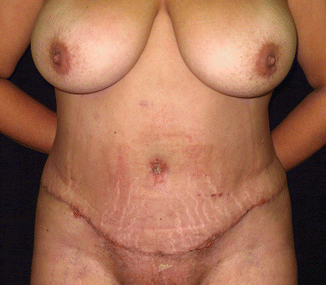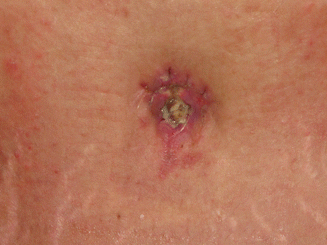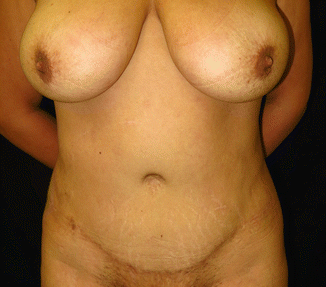Fig. 35.1
Preoperative lipoabdominoplasty
The patient then underwent laparoscopic appendectomy for suppurative appendicitis. The ports were placed above the umbilicus, left iliac fossa, and left lateral surface of the abdominoplasty incision. The diseased appendix was removed from the abdominal cavity through the left side of the abdominal incision.
Patient had a good postoperative course and was discharged on the first day after the appendectomy. She was reevaluated by the plastic surgery unit 3 days after, and inflammation was noticed in the umbilical region, local where the appendix was removed. Therefore, antibiotic therapy was kept for additional 7 days. She was then reassessed 22 days postoperatively and the umbilicus was shallower, probably by loss of umbilical suture attachment, secondary to pneumoperitoneum and insertion of the umbilical trocar during laparoscopic procedure. The umbilicus was treated with local wound care and clinical observation (Figs. 35.2, 35.3, and 35.4).




Fig. 35.2
Postoperative abdominoplasty and laparoscopic appendectomy

Fig. 35.3
Inflammatory process in the umbilical region after de removal of the appendices through that site

Fig. 35.4
One-year postoperative
35.8 Conclusions
This chapter demonstrates the importance of postoperative follow-up by the same surgeon who performed the procedure and the need for adequate general surgery training. Abdominoplasty is a very common elective procedure in plastic surgery. Surgical accidents can also lead to dreadful complications causing acute surgical abdomen, but in rare cases, there is acute surgical abdomen not related to the procedure. Moreover, the delay in diagnosis could certainly lead to sepsis and a fatal outcome. Acute awareness and early operation are necessary to prevent potentially fatal outcomes. The take-home message for surgeons is that they should consider all potential causes for patient’s complaint and do a thorough investigation before attributing a cause to postoperative complications.








